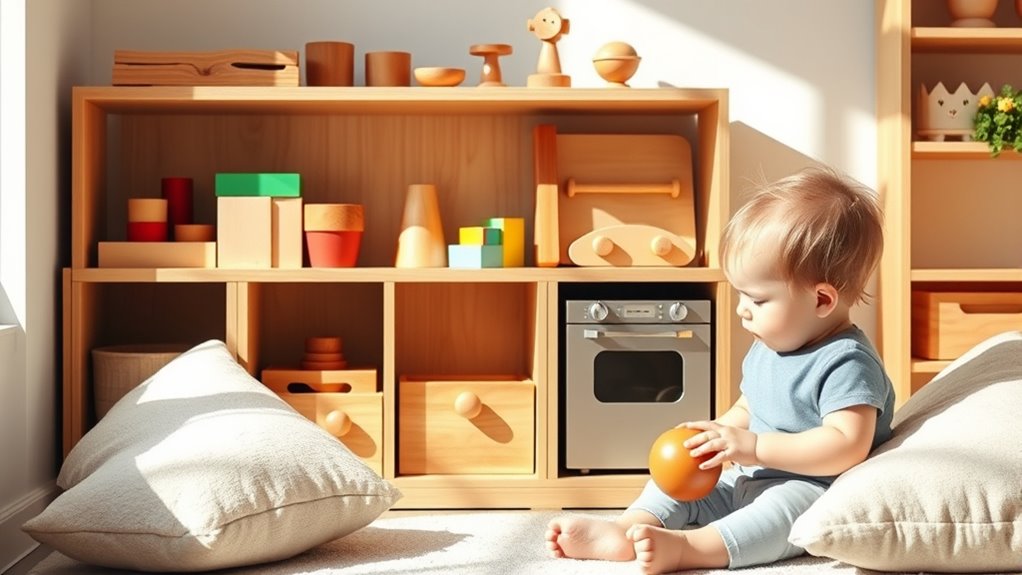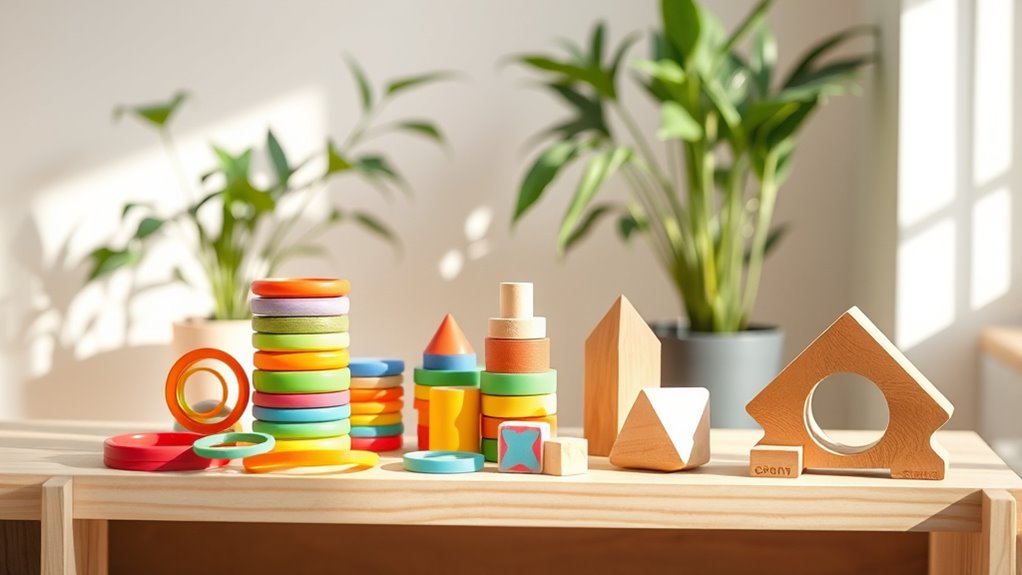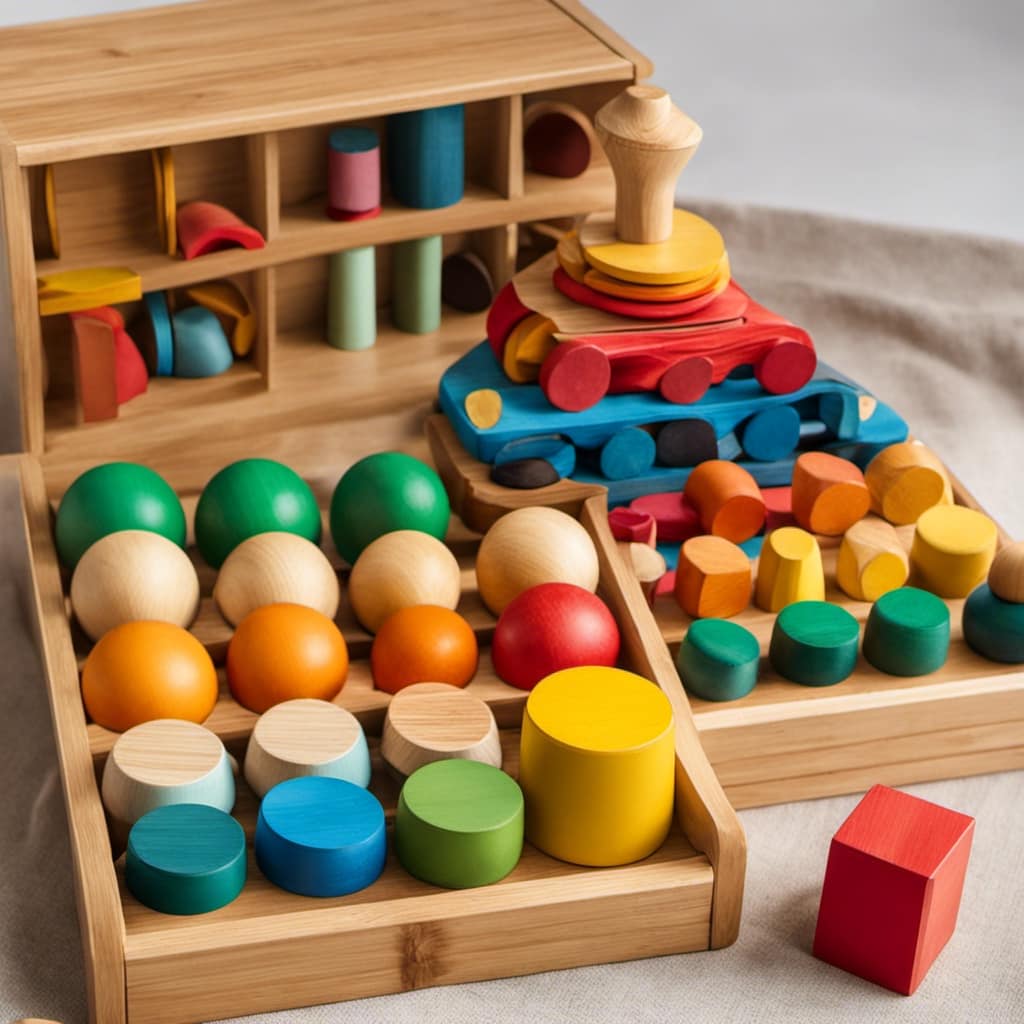Montessori toys are carefully designed tools that encourage your child’s independence, sensory exploration, and fine motor skills. These toys focus on hands-on activities that promote active learning and engagement, often made from natural materials like wood. They help your child develop coordination, patience, and curiosity through simple, purposeful play. By choosing these toys, you support your child’s holistic growth. Keep exploring to discover how these toys can make learning both fun and meaningful.
Key Takeaways
- Montessori toys promote independent learning through hands-on, sensory-rich activities that encourage exploration and active participation.
- They are made from natural materials like wood or fabric, emphasizing simplicity and eco-friendliness.
- Focused on developing fine motor skills by involving small muscle movements such as stacking, threading, and fitting shapes.
- Designed to stimulate all five senses, helping children understand their environment and enhance sensory awareness.
- They nurture curiosity, confidence, and a love for learning by supporting holistic development and self-directed exploration.

Montessori toys are designed to promote independent learning and hands-on exploration, making them a popular choice for parents and educators alike. These toys focus on engaging your child’s senses and encouraging active participation, which are key to overall development. One of the main features of Montessori toys is their emphasis on sensory play. Sensory play involves activities that stimulate your child’s senses—touch, sight, sound, taste, and smell—helping them process and understand the world around them. When you choose Montessori toys, you’re providing your child with opportunities to explore textures, colors, and sounds in a way that enhances their sensory awareness. This type of play not only keeps your little one engaged but also lays the foundation for more complex cognitive skills.
Montessori toys foster sensory exploration and active participation for holistic childhood development.
In addition to sensory stimulation, Montessori toys are crafted to boost fine motor skills. Fine motor skills involve the use of small muscles in the hands and fingers, which are essential for tasks like writing, buttoning, and tying shoelaces. When your child manipulates Montessori toys—such as stacking blocks, threading beads, or fitting shapes into matching holes—they practice precise movements that strengthen these small muscles. As your child repeats these actions, their hand-eye coordination improves, and they develop better control over their movements. This hands-on approach allows your child to learn through trial and error, fostering patience and problem-solving abilities along the way.
What makes Montessori toys particularly effective is their simplicity and focus. Unlike many electronic toys, they typically lack flashy lights or sounds that can distract or overstimulate your child. Instead, they encourage careful observation and deliberate actions. When your child interacts with these toys, they learn to concentrate and develop patience, which are essential skills for lifelong learning. Additionally, because Montessori toys are often made from natural materials like wood or fabric, they offer a tactile experience that enhances sensory exploration and supports eco-friendly choices. Moreover, incorporating these toys into your child’s routine aligns with educational best practices that emphasize holistic development and sustainable learning environments.
Choosing Montessori toys means investing in your child’s holistic development. They help your little one build a strong sensory foundation and refine their fine motor skills, all while nurturing independence and curiosity. As your child engages with these thoughtfully designed toys, you’ll notice their confidence grow as they master new skills through exploration. This approach not only supports their immediate developmental milestones but also cultivates a love for learning that can last a lifetime.
Frequently Asked Questions
How Do Montessori Toys Differ From Traditional Toys?
You’ll notice that Montessori toys differ from traditional toys because they focus on sensorial exploration and support cognitive development. These toys are designed to promote hands-on learning, encouraging your child to explore textures, shapes, and sounds at their own pace. Unlike conventional toys that often have quick entertainment value, Montessori toys foster concentration, problem-solving, and independence, helping your child develop essential skills through self-directed play.
Are Montessori Toys Suitable for All Age Groups?
Think of Montessori toys as keys opening different age doors. You’ll find they suit all age groups by supporting sensorimotor play, which sharpens your child’s senses and coordination. These toys foster cognitive development at every stage, adapting to their growing skills. Whether a toddler or older child, Montessori toys encourage exploration, making learning natural and enjoyable. They’re thoughtfully designed to match your child’s evolving needs, ensuring age-appropriate growth and discovery.
How Can I Identify Authentic Montessori Toys?
To identify authentic Montessori toys, look for items that promote sensorial exploration and are made from natural materials like wood or cotton. Genuine Montessori toys are simple, intentionally designed, and encourage independent play. Avoid overly bright plastic toys or those with unnecessary features. Trust your instincts—authentic toys foster curiosity and learning through hands-on experiences, helping your child develop concentration, coordination, and a love for exploration.
Can Montessori Toys Help With Specific Developmental Skills?
They say, “You are never too old to learn,” and Montessori toys prove this true. Yes, they can help with specific developmental skills like fine motor skills and cognitive development. By engaging your child in hands-on activities, these toys encourage problem-solving, concentration, and precise movements. As they explore, your child builds a strong foundation for future learning, making playtime both fun and educational.
Where Can I Buy High-Quality Montessori Toys?
You can find high-quality Montessori toys at reputable online retailers like Melissa & Doug or Learning Resources, which prioritize toy safety and durability. Local specialty stores often carry curated selections, allowing you to see the toys firsthand. Be sure to do a price comparison to guarantee you’re getting the best value. Always check for safety certifications and non-toxic materials to safeguard your child’s health and development.
Conclusion
Incorporating Montessori toys into your child’s playtime can boost their development and foster independence. Did you know that children who engage with Montessori-style toys often show improved problem-solving skills and focus? By choosing simple, stimulating, and age-appropriate toys, you’re giving your little one the tools to explore and learn naturally. Remember, the goal is to encourage curiosity and confidence, making playtime both fun and educational. Your child’s growth benefits greatly from mindful toy choices!










